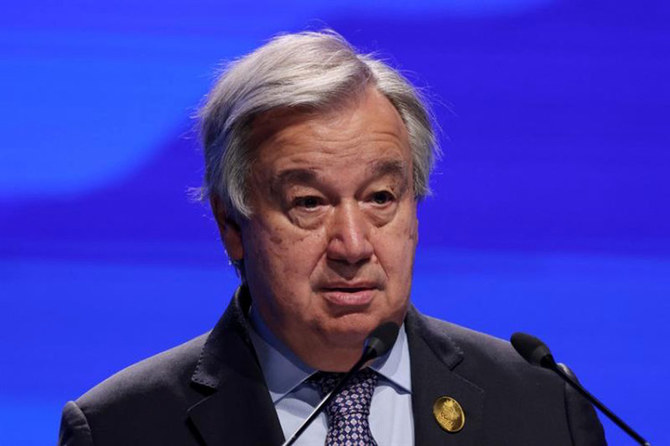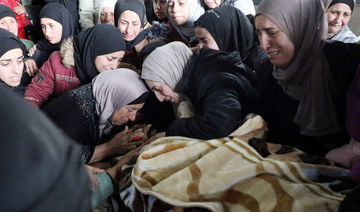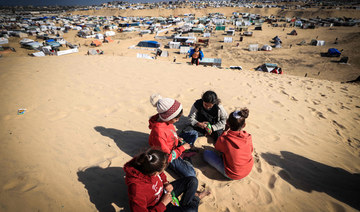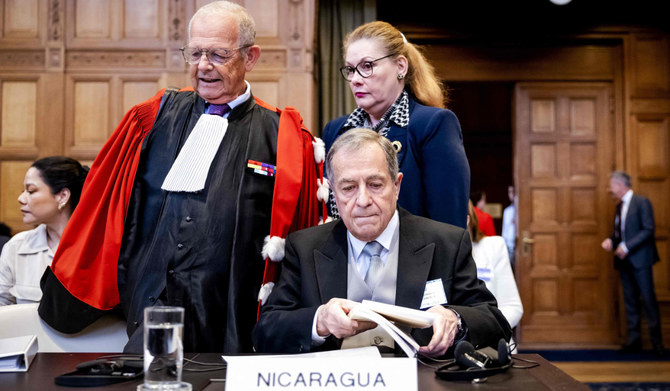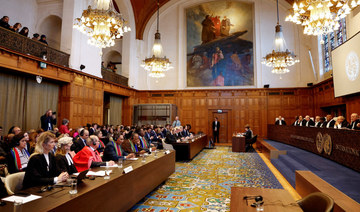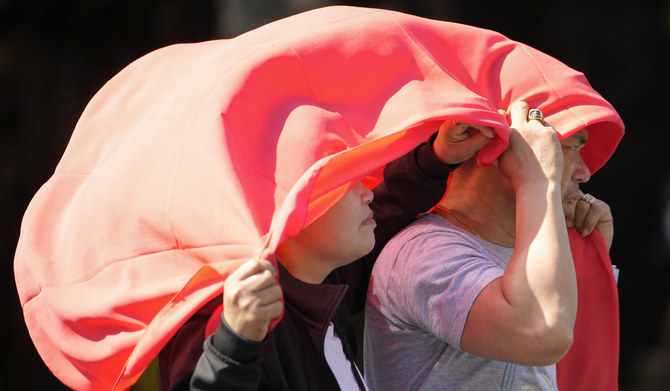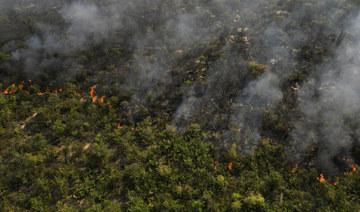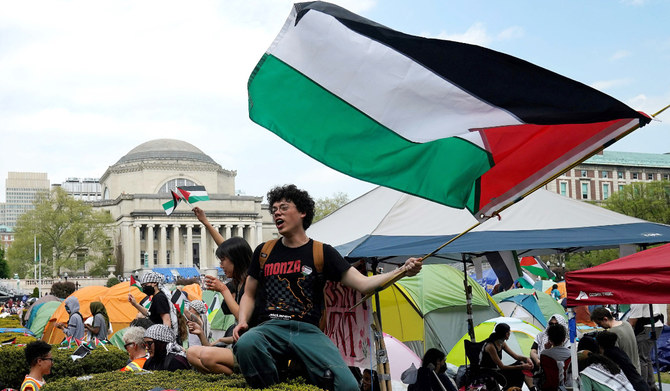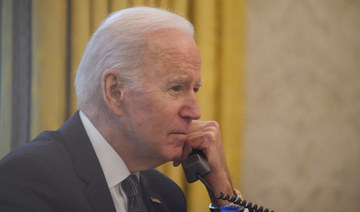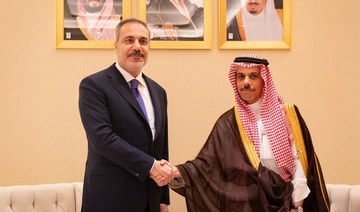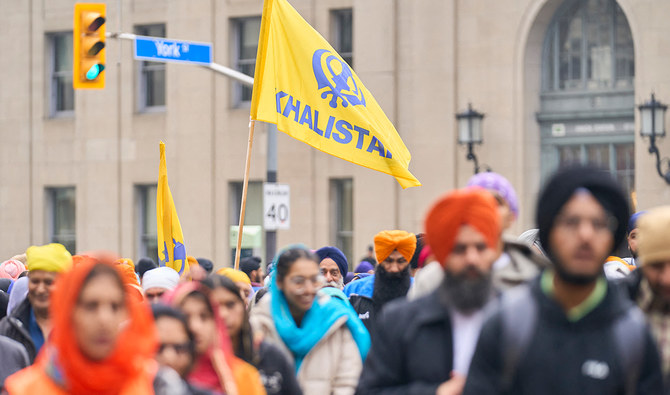NEW YORK CITY: UN Secretary-General Antonio Guterres on Monday said he is deeply troubled by the “clear violation of international humanitarian law” the world continues to witness as “the long shadow of starvation is stalking the people of Gaza, along with disease, malnutrition and other health threats.”
He lamented the fact that, despite some efforts to step up the delivery of humanitarian aid to Gaza, essential relief on the required scale is still not reaching desperate civilians who have endured months of continuous Israeli attacks.
He described the humanitarian situation in the territory as “beyond words” and repeated his warning that “nowhere and no one is safe” there. He added that “traumatized people are being pushed into increasingly limited areas in the south that are becoming intolerably and dangerously congested.”
The UN chief was speaking during a press briefing in New York marking the grim milestone of 100 days of the war in Gaza.
Guterres began by once again demanding the “immediate and unconditional release of all (Israeli) hostages” still held by Hamas and other groups. He called for them to be treated humanely while they remain in captivity and for representatives of the International Committee of the Red Cross to be allowed to visit them.
He said he has been thinking of the anguish the hostages’ families have been feeling “every day” since the “horrific Oct. 7 attacks by Hamas that claimed the lives of more than 1,000 Israelis and others, and resulted in the brutal seizing of hostages.”
Guterres also called for all allegations of sexual violence committed by Hamas and others on Oct. 7 to “be rigorously investigated and prosecuted.”
“Nothing can justify the deliberate killing, injuring and kidnapping of civilians, or the launching of rockets toward civilian targets,” he said.
But he added that “the onslaught on Gaza by Israeli forces over these 100 days has unleashed wholesale destruction and levels of civilian killings at a rate that is unprecedented during my years as secretary-general.”
The death toll in the Gaza Strip has reached 24,100 since the war began on Oct. 7, and more than 60,834 people have been wounded, according to figures from the Gazan Health Ministry. Guterres said the vast majority of those killed are women and children, and added: “Nothing can justify the collective punishment of the Palestinian people.”
He called on all states and parties to the conflict to fully cooperate with Sigrid Kaag, who on Jan. 8 took on the role of the UN’s senior humanitarian and reconstruction coordinator for Gaza, a position called for by Security Council Resolution 2720 on the Gaza conflict, which was adopted on Dec. 22.
Kaag, former finance minister and first deputy prime minister of the Netherlands, will work to coordinate, monitor and verify the delivery of humanitarian aid to Gaza, including the establishment of a UN mechanism to speed up the transit of aid convoys through countries that are not directly involved in the conflict.
Guterres said an effective aid operation in Gaza requires security, assurances about the safety of UN staff, necessary logistical support and the resumption of commercial activity in the territory.
However, “the obstacles to aid delivery are clear,” he said, adding that the “heavy, widespread and unrelenting bombardment” of Gaza is endangering the lives of those receiving aid, as well as those delivering it.
“The vast majority of our Palestinian staff in Gaza have been forced to flee their homes,” said Guterres.
“Since Oct. 7, 152 UN staff members have been killed in Gaza, the largest single loss of life in the history of our organization, a heart-wrenching figure and a source of deep sorrow.”
He called again for “rapid, safe, unhindered, expanded and sustained humanitarian access into and across Gaza.”
Guterres also highlighted the “significant hurdles” to aid delivery that persist at Gaza’s borders.
“Vital materials, including life-saving medical equipment and parts which are critical for the repair of water facilities and infrastructure, have been rejected with little or no explanation, disrupting the flow of critical supplies and the resumption of basic services,” he said.
“And when one item is denied, the time-consuming approval process starts again from scratch for the entire cargo.”
The aid operation faces other “major impediments” within Gaza itself, he added, including repeated denials of permission for access to the north of the territory, where hundreds of thousands of people remain.
“Since the start of the year, just seven of 29 missions to deliver aid to the north have been able to proceed,” said Guterres. “Large stretches of agreed routes cannot be used due to heavy fighting and debris, with unexploded ordnance also threatening convoys.
“Humanitarian notification systems to maximize the safety of aid operations are not being respected. In addition, frequent telecommunications blackouts mean humanitarian workers cannot seek out the safest roads, coordinate aid distribution or track the movements of displaced people who need assistance.”
As the UN attempts to ramp up its humanitarian response in Gaza, Guterres once again called on all parties to the conflict to respect the principles of international humanitarian law, “respect and protect civilians, and ensure their essential needs are met.” He also called for “an immediate and massive” increase in the commercial supply of essential goods.
“The UN and humanitarian partners cannot alone provide basic necessities that should also be available in markets to the entire population,” he said.
Addressing the situation in the West Bank, Guterres expressed deep concern about the escalating “cauldron of tensions” there, in which rising violence is exacerbating an already severe financial crisis for the Palestinian Authority.
He also sounded the alarm over the “sky-high” tensions in the Red Sea area and beyond, which he said might soon be impossible to contain.
He expressed “profound worries” about the daily exchanges of fire across the Blue Line separating northern Israel and southern Lebanon, in areas where tens of thousands of people on both sides have been displaced, and which risk triggering a broader escalation between the two countries that could profoundly affect regional stability.
“Stop playing with fire across the Blue Line, deescalate and bring hostilities to an end in accordance with Security Council Resolution 1701,” Guterres said. Resolution 1701 was adopted by the council in 2006 with the aim of resolving the war that year between Israel and Hezbollah.
Guterres concluded by reiterating the steps required to address all of the issues he raised: “We need an immediate humanitarian ceasefire; to ensure sufficient aid gets to where it is needed; to facilitate the release of the hostages; to tamp down the flames of wider war because the longer the conflict in Gaza continues, the greater the risk of escalation and miscalculation.
“We cannot see in Lebanon what we are seeing in Gaza. And we cannot allow what has been happening in Gaza to continue.”



